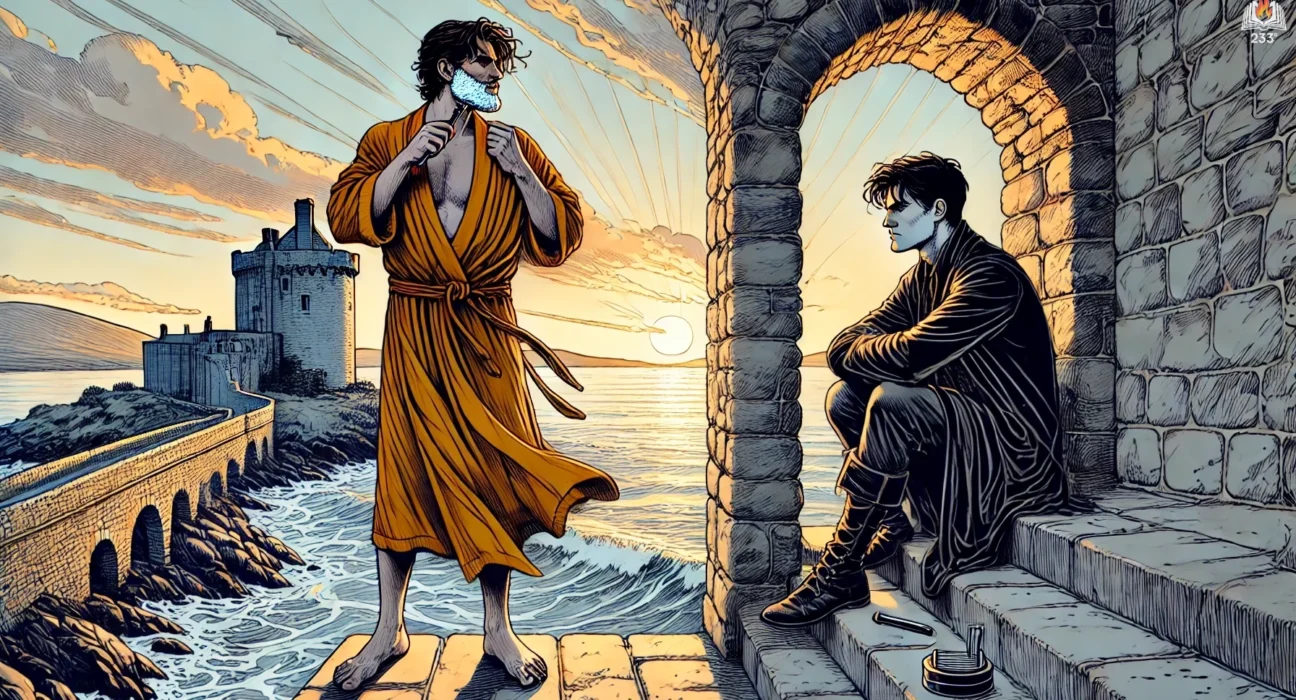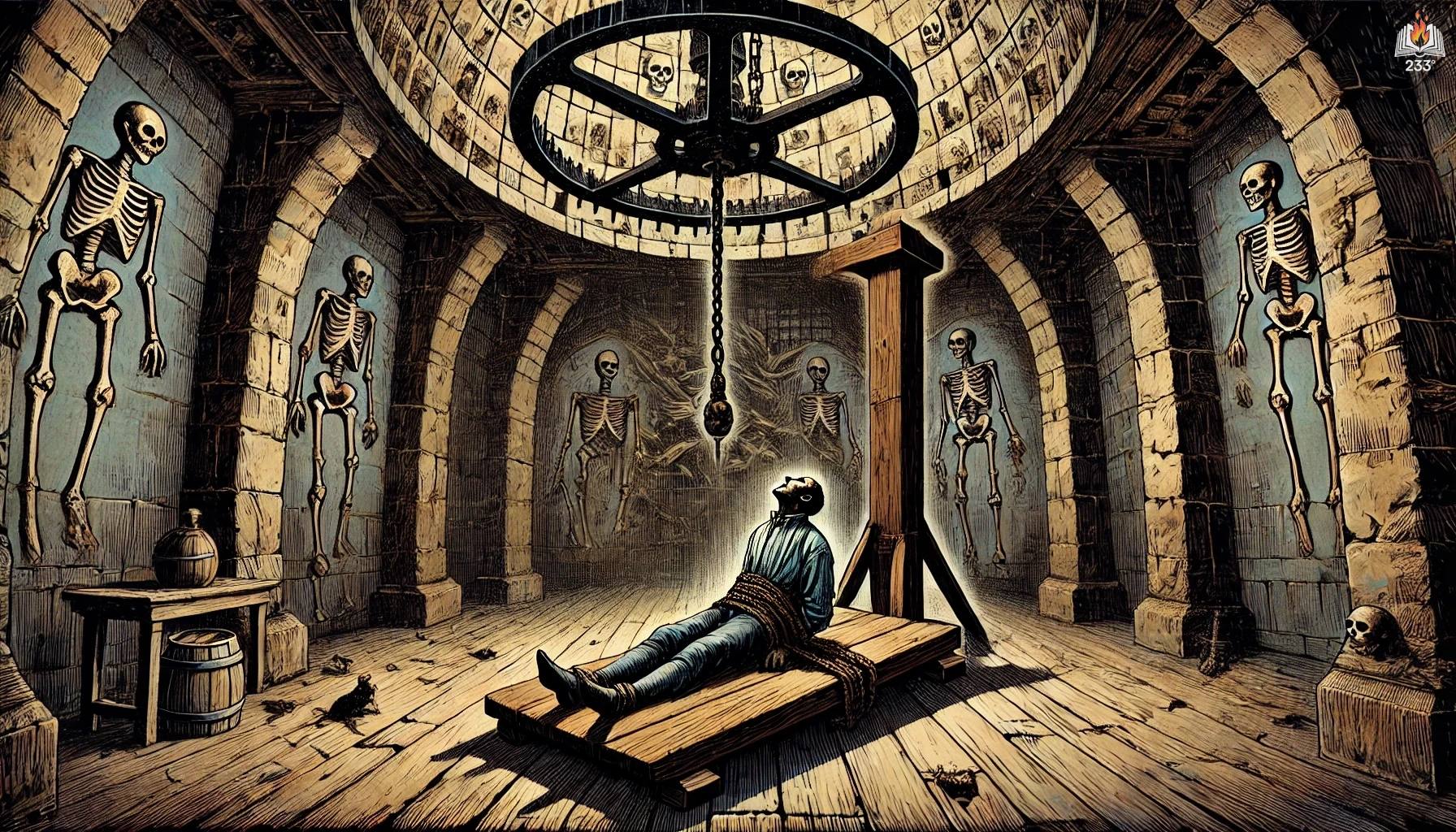Ulysses by James Joyce, first published in 1922, is a landmark modernist novel. It is structured as a day-in-the-life of Leopold Bloom, a Jewish man living in Dublin, Ireland, on June 16, 1904. The novel mirrors The Odyssey by Homer, drawing parallels between Bloom’s ordinary day and the epic adventures of Odysseus. Joyce’s groundbreaking narrative techniques, stream-of-consciousness writing, and exploration of themes like identity, nationalism, and the human condition make Ulysses one of the most influential works of the 20th century.
Plot Summary
Morning breaks over the Martello tower in Dublin, where Buck Mulligan, a bold, mocking medical student, prepares to shave. His companion, Stephen Dedalus, a young teacher and artist, watches quietly, burdened by inner turmoil. Mulligan’s irreverence grates on Stephen, who harbors resentment for a comment Mulligan once made about Stephen’s deceased mother. As Mulligan teases, Stephen’s thoughts wander through his guilt over his mother’s death and his frustrations with life. A third man, Haines, an Englishman, lodges with them, adding to the tension. After a strained breakfast, Stephen refuses to lend Mulligan the key to the tower, feeling isolated even among supposed friends.
Leopold Bloom begins his day by preparing breakfast for his wife, Molly, whose lingering presence in bed hints at a languid sensuality. She has an appointment later with Blazes Boylan, her manager, and soon-to-be lover, a fact Bloom avoids confronting directly. Bloom leaves the house and, walking through Dublin’s streets, muses on mundane subjects—his Jewish identity, bodily functions, and fleeting thoughts of his son Rudy, who died in infancy. His day is punctuated by encounters that, while ordinary, trigger waves of memory and emotion.
Stephen, meanwhile, arrives at the school where he teaches, distracted and detached. His students seem distant, and his mind is elsewhere, wandering through philosophical musings, religious skepticism, and personal guilt. His conversation with the headmaster, Mr. Deasy, further isolates him. Deasy lectures him on money and success, both of which Stephen dismisses, feeling increasingly disconnected from the traditional paths others expect him to follow. He leaves, determined to escape Dublin’s stifling environment, though uncertain how.
Bloom’s day unfolds through encounters with Dubliners, each offering a glimpse into his compassionate and observant nature. As he walks through town, he buys a bar of soap, visits the butcher, and wanders into a funeral for Paddy Dignam, an acquaintance. At the cemetery, Bloom reflects on death, the body’s decay, and his father’s suicide. The ever-present thought of Molly’s impending infidelity with Boylan haunts him, though he tries to push it aside. Throughout the day, Bloom’s thoughts oscillate between his role as husband and father, his suppressed grief over Rudy, and the deep loneliness he feels within his marriage.
Later, Bloom and Stephen’s paths begin to converge, though neither is aware of the other just yet. Bloom visits the National Library, where Stephen engages in a spirited discussion about Shakespeare, offering his controversial interpretation of Hamlet. Stephen’s argument, infused with personal insights and literary references, leaves his listeners intrigued, but Stephen remains disconnected, feeling the weight of his intellectual isolation.
Meanwhile, Bloom continues to drift through the city. His wanderings take him to a newspaper office, a maternity hospital, and eventually to the beach at Sandymount. There, Bloom watches Gerty MacDowell, a young woman, who, sensing his gaze, subtly reveals her legs in a moment of erotic tension. This voyeuristic encounter stirs Bloom, yet it leaves him feeling more isolated and reflective. He thinks again of Molly and Boylan, their afternoon tryst now surely underway.
As the day turns to evening, Bloom finds himself at Barney Kiernan’s pub, where a heated discussion about politics and Irish nationalism unfolds. Bloom’s Jewish heritage makes him a target for anti-Semitic jabs, yet he remains calm, deflecting the insults with quiet dignity. The pub scene turns chaotic, but Bloom eventually leaves, continuing his aimless journey through the city’s streets.
Stephen, on the other hand, is growing increasingly drunk, having joined his friends for a night of revelry. They visit the brothel district, where Stephen’s psychological state unravels. Haunted by visions of his dead mother, and overwhelmed by guilt and confusion, he lashes out, breaking a chandelier in a fit of anger. Bloom, who has been nearby, watching the night unfold, steps in to help Stephen, recognizing in the young man something of himself—a lost soul, searching for meaning.
Bloom, ever the caregiver, takes Stephen back to his home. The two men share a quiet moment in the kitchen, where Bloom offers Stephen a place to rest. They discuss life, art, and their respective struggles, yet the connection between them remains tentative. Bloom, fatherly in his approach, sees in Stephen the son he lost, while Stephen, still raw and defensive, hesitates to fully accept Bloom’s kindness. After some time, Stephen decides to leave, and Bloom, though saddened, respects his decision. The night has been long, and Bloom returns to his bed, where Molly sleeps.
In the early hours, Molly’s thoughts take over the narrative. Her soliloquy reveals her inner life—her thoughts on love, sex, motherhood, and her affair with Boylan. She reflects on her relationship with Bloom, the passion they once shared, and her own desires and regrets. In this final chapter, Molly’s voice brings the novel full circle, offering a candid and intimate glimpse into the mind of the woman who has been at the heart of Bloom’s day. As she recalls the moment Bloom proposed to her, she concludes with a simple yet profound affirmation of life: “Yes.”
Main Characters
Leopold Bloom: The protagonist, a middle-aged Jewish man, whose mundane daily life becomes an odyssey of personal and philosophical exploration. He is introspective, compassionate, and deals with complex emotions surrounding his wife’s infidelity and his own sense of belonging in Dublin.
Molly Bloom: Leopold’s wife, Molly is a singer and central figure in his emotional life. She is unfaithful to him, a fact Bloom grapples with throughout the day. Her character is brought to life in the final chapter, where her soliloquy reveals her thoughts on love, sexuality, and life.
Stephen Dedalus: A young intellectual and the protagonist of Joyce’s earlier novel A Portrait of the Artist as a Young Man. In Ulysses, Stephen is struggling with his identity, guilt over his mother’s death, and his disillusionment with religion and nationalism. He represents a Telemachus figure in the novel’s Homeric parallel.
Buck Mulligan: A boisterous and irreverent medical student, Buck shares a complex friendship with Stephen. His mocking of Irish religion and nationalism contrasts with Stephen’s more serious intellectual struggles.
Gerty MacDowell: A young woman Bloom encounters at the beach. She represents an idealized image of femininity and purity, which contrasts with Bloom’s more complex and sometimes darker views on sexuality and desire.
Theme
Identity and Isolation: Both Bloom and Stephen struggle with their senses of self. Bloom, as a Jewish man in Catholic Ireland, is an outsider, while Stephen feels alienated by his intellectualism and guilt over his family. The novel often explores how one’s identity is shaped by personal history, society, and inner turmoil.
Stream-of-Consciousness and Inner Life: Joyce uses stream-of-consciousness to delve deeply into the minds of his characters. The way thoughts flow freely—often illogically—reflects the chaos of inner life and the complexities of human consciousness.
Religion and Guilt: Stephen’s battle with Catholicism and his guilt over his mother’s death reveal the tension between personal freedom and religious duty. Bloom, on the other hand, represents a more secular, humanist outlook, contrasting Stephen’s struggles.
Sexuality: Ulysses explores sexuality in various forms, from Bloom’s voyeuristic episode with Gerty to Molly’s unapologetic sensuality. The novel doesn’t shy away from the complexity of sexual desire, often blending it with themes of guilt and repression.
Nationalism and Exile: The book critiques Irish nationalism through characters like Stephen, who struggles with the idea of being tied to a country steeped in tradition and religion. Bloom, as an outsider, offers a more cosmopolitan perspective, unbound by nationalist sentiment.
Writing Style and Tone
James Joyce’s writing in Ulysses is famously experimental, and one of its most distinguishing features is its stream-of-consciousness technique, which allows readers to dive into the characters’ thoughts in an uninterrupted flow. This technique replicates the fragmented, non-linear nature of human thinking, moving fluidly between memories, sensations, and ideas. Joyce also frequently shifts narrative styles, from the journalistic to the lyrical, and even mimics the styles of classic literature. This constant fluctuation challenges readers but enriches the novel’s texture, offering multiple layers of interpretation.
The tone of Ulysses is deeply ironic and often humorous. Joyce imbues even mundane moments with a grandiose, mock-heroic tone, reflecting the novel’s Homeric parallels. Yet beneath the humor, there’s a melancholic exploration of human existence, with themes of mortality, regret, and unfulfilled desires. This balance between the comic and the tragic, the epic and the everyday, gives Ulysses its unique emotional resonance.
We hope this summary has sparked your interest and would appreciate you following Celsius 233 on social media:
There’s a treasure trove of other fascinating book summaries waiting for you. Check out our collection of stories that inspire, thrill, and provoke thought, just like this one by checking out the Book Shelf or the Library
Remember, while our summaries capture the essence, they can never replace the full experience of reading the book. If this summary intrigued you, consider diving into the complete story – buy the book and immerse yourself in the author’s original work.
If you want to request a book summary, click here.
When Saurabh is not working/watching football/reading books/traveling, you can reach him via Twitter/X, LinkedIn, or Threads
Restart reading!








